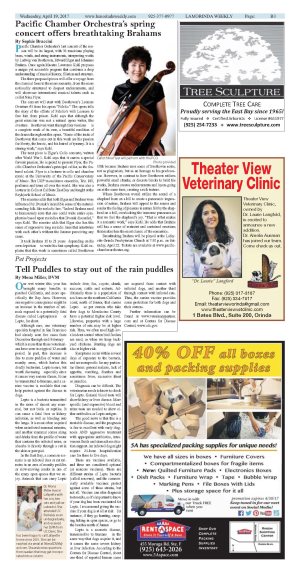| | Published April 19th, 2017
| Pet Projects
| | Tell Puddles to stay out of the rain puddles | | By Mona Miller, DVM |  | | Dr. Mona Miller lives in Lafayette with her son, two cats and yellow Labrador. She attended UC Berkeley as an undergraduate, and received her DVM from UC Davis. She has been happy to call Lafayette home since 2001. She can be reached via email at MonaSDVM@aol.com. She welcomes questions from readers that may get incorporated into a column. |
Our wet winter this year has brought many benefits to parched California, and more specifically the Bay Area. However, one negative consequence might be an increase in the number of animals exposed to a potentially fatal disease called Leptospirosis - or Lepto, for short.
 Although rare, one veterinary specialty hospital in San Francisco had already seen five cases from December through mid-February - which is more than those veterinarians have seen in a typical 12-month period. In part, this increase is due to more puddles of water and marshy areas, which harbor this deadly bacterium. Lepto is rare, but worth discussing - especially since it causes very serious illness. It can be transmitted to humans, and a canine vaccine is available that can help protect against the disease in dogs.
Although rare, one veterinary specialty hospital in San Francisco had already seen five cases from December through mid-February - which is more than those veterinarians have seen in a typical 12-month period. In part, this increase is due to more puddles of water and marshy areas, which harbor this deadly bacterium. Lepto is rare, but worth discussing - especially since it causes very serious illness. It can be transmitted to humans, and a canine vaccine is available that can help protect against the disease in dogs.
 Lepto is a bacteria transmitted in the urine of almost any mammal, but not birds or reptiles. It can cause a fatal liver or kidney infection, as well as bleeding into the lungs. It is most often acquired when an infected mammal urinates, and another mammal comes along and drinks from the puddle of water that contains the infected urine, or absorbs it directly through a cut in the skin or paw pad.
Lepto is a bacteria transmitted in the urine of almost any mammal, but not birds or reptiles. It can cause a fatal liver or kidney infection, as well as bleeding into the lungs. It is most often acquired when an infected mammal urinates, and another mammal comes along and drinks from the puddle of water that contains the infected urine, or absorbs it directly through a cut in the skin or paw pad.
 In the East Bay, a common scenario is an infected deer or rat urinates in an area of marshy puddles or slow-moving creeks in one of the many open spaces that we enjoy. Animals that can carry Lepto include deer, fox, coyote, skunk, raccoon, cattle and rodents. Additionally there is a population of sea lions on the northern California coast, north of Jenner, that carries Lepto - so pet owners who take their dogs to Mendocino County have a potential higher risk level. Likewise, properties with a large number of rats may be at higher risk. Thus, we often need high-level rodent control when bird feeders are used, or when we keep backyard chickens. Hunting dogs are also at higher risk.
In the East Bay, a common scenario is an infected deer or rat urinates in an area of marshy puddles or slow-moving creeks in one of the many open spaces that we enjoy. Animals that can carry Lepto include deer, fox, coyote, skunk, raccoon, cattle and rodents. Additionally there is a population of sea lions on the northern California coast, north of Jenner, that carries Lepto - so pet owners who take their dogs to Mendocino County have a potential higher risk level. Likewise, properties with a large number of rats may be at higher risk. Thus, we often need high-level rodent control when bird feeders are used, or when we keep backyard chickens. Hunting dogs are also at higher risk.
 Symptoms occur within several days of exposure to the bacteria, and are nonspecific for any particular illness: general malaise, lack of appetite, vomiting, diarrhea and sometimes fever, excessive thirst or jaundice.
Symptoms occur within several days of exposure to the bacteria, and are nonspecific for any particular illness: general malaise, lack of appetite, vomiting, diarrhea and sometimes fever, excessive thirst or jaundice.
 Diagnosis can be difficult. The veterinarian needs to know to check for Lepto. General blood tests will show kidney or liver disease. More specific (and expensive) blood and urine tests are needed to show either antibodies or Lepto antigen.
Diagnosis can be difficult. The veterinarian needs to know to check for Lepto. General blood tests will show kidney or liver disease. More specific (and expensive) blood and urine tests are needed to show either antibodies or Lepto antigen.
 The good news is that this is a treatable disease, and the prognosis is fair to excellent with early diagnosis AND aggressive treatment with appropriate antibiotics, intravenous fluids and stomach medication support. An infected dog might require 24-hour hospitalization care for three to five days.
The good news is that this is a treatable disease, and the prognosis is fair to excellent with early diagnosis AND aggressive treatment with appropriate antibiotics, intravenous fluids and stomach medication support. An infected dog might require 24-hour hospitalization care for three to five days.
 There are vaccines available, and these are considered optional (or noncore vaccines). There are different strains of Lepto bacteria (called serovars), and the commercially available vaccines protect against some of these strains, but not all. Vaccine can alter diagnosis test results, so it's important to know if your dog has been vaccinated for Lepto. I recommend giving the vaccine if your dog is at all at risk - for instance, if they go hunting, camping, hiking in open spaces, or go to the beaches north of Jenner.
There are vaccines available, and these are considered optional (or noncore vaccines). There are different strains of Lepto bacteria (called serovars), and the commercially available vaccines protect against some of these strains, but not all. Vaccine can alter diagnosis test results, so it's important to know if your dog has been vaccinated for Lepto. I recommend giving the vaccine if your dog is at all at risk - for instance, if they go hunting, camping, hiking in open spaces, or go to the beaches north of Jenner.
 Lepto is a zoonotic disease, transmissible to humans - in the same way that dogs acquire it, and it causes the same severe kidney or liver infection. According to the Centers for Disease Control, about one-third of reported human cases are acquired from contact with infected dogs, and another third through contact with infected rats. Thus, the canine vaccine provides some protection for both dogs and their owners.
Lepto is a zoonotic disease, transmissible to humans - in the same way that dogs acquire it, and it causes the same severe kidney or liver infection. According to the Centers for Disease Control, about one-third of reported human cases are acquired from contact with infected dogs, and another third through contact with infected rats. Thus, the canine vaccine provides some protection for both dogs and their owners.
 Further information can be found at www.veterinarypartner.com and at Centers for Disease Control, www.cdc.gov.
Further information can be found at www.veterinarypartner.com and at Centers for Disease Control, www.cdc.gov.


|
| | | | | | | | | | | | |



